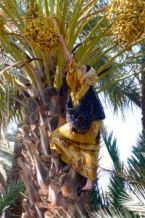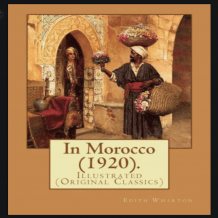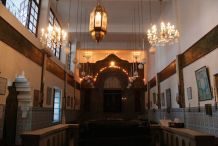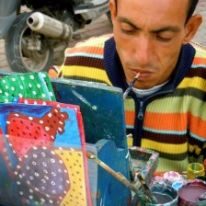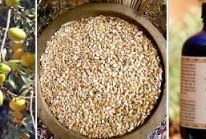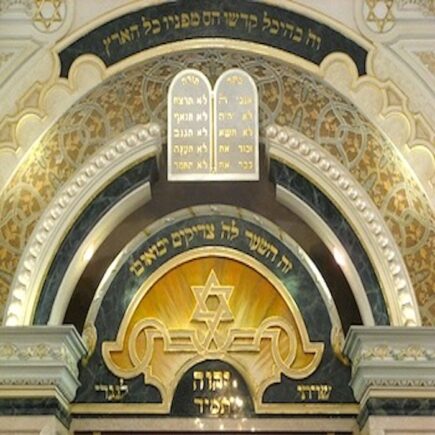
Casablanca is respectively admired for its longstanding Jewish Heritage. Discover the history of this white Imperial City on a Casablanca Jewish Heritage Tour. The Jewish community in Casablanca, Morocco has a strong history that has survived along with it’s synagogues, cemeteries, monuments and shrines. When visiting Morocco for a Casablanca Jewish Heritage tour you can do so by flying directly into Casablanca for a longer circuit or instead on a port tour.
The Jewish Community in Casablanca: A Rich History
The 4,500 Casablancan Jews in Casablanca live outside the mellah in the European city, where they worship in over 30 synagogues, eat in kosher restaurants, entertain themselves in community centers, and attend Jewish schools and social service centers. Jewish Casablancan’s worship at Temple Beth El, the largest synagogue and an important community center, seating 500 persons. The Jewish community of Casablanca also contributed to the construction of the Hassan II Mosque, the second largest in the world. On a Jewish Heritage Tour it is possible to visit the Muslim shine of Sidi Belyout. Some Jews visit annually the Muslim shrine of Sidi Belyout, Casablanca’s patron saint. Many Jews of Casablanca celebrate the hiloula of the saint Yahia Lakhdar in Ben Ahmed, about an hour south of Casablanca near the town of Settat.
On a Casablanca Jewish Heritage Tour you will start your morning off visiting Casablanca’s Jewish Sacred sites and then continue seeing the highlights of old Casablanca. The synagogues, cemeteries, monuments and communal institutions of Casablanca show how important the city has been to the Jewish community during the twentieth century.
Temple Beth-El: The Center of Jewish Life
Visit Temple Beth-El, the Jewish Synagogue in Casablanca. Beth-El, is considered the center piece of a once vibrant Jewish community. Its stained glass windows and other artistic elements, is what attracts tourists to this synagogue.
Exploring the Jewish Mellah on a Casablanca Jewish Heritage Tour
The mellah of Casablanca is young by Moroccan standards, not much more than a century old. It assaults the senses in the evening, with a sea of women in brightly colored djellabahs carrying and selling fruit and vegetables throughout the cramped, narrow streets. While Jews no longer live in the mellah, kosher butchers are found in the old market, next to other butchers selling horse meat. The Jewish cemetery in the mellah is open and quiet, with well-kept white stone markers in French, Hebrew and Spanish. Once a year, Casablancans celebrate a hiloula, or prayer festival, at the tomb of the Jewish saint, Eliahou.
Museum of Moroccan Judaism: A Unique Cultural Treasure Visited on a Casablanca Jewish Heritage Tour
Visit the Museum of Moroccan Judiasm in Casablanca. The Museum of Moroccan Judaism of Casablanca is a museum of history and ethnography, created by the Jewish Community of Casablanca in 1997 with the support of the Foundation of Jewish-Moroccan Cultural Heritage. The Jewish Museum in Casablanca is tucked into a residential neighborhood and holds a treasure trove with it being the Arab region’s only Jewish Museum. It uses world-class standards of conservation for its national and international collections. The Museum of Moroccan Judaism presents religious, ethnographic and artistic objects that demonstrate the history, religion, traditions and daily life of Jews in the context of Moroccan civilization.
Our Casablanca Jewish Heritage Tour includes a visiting the Museum of Moroccan Judaism, the first of its king in the Arab world. The Jewish Museum covers an area of 700 square meters:
– A large multipurpose room, used for exhibitions of painting, photography and sculpture
– Three other rooms, with windows containing exhibits on religious and family life (oil lamps, Torahs, Chanukah lamps, clothing, marriage contracts (ketubot) Torah covers… and exhibits on work life;
– Two rooms displaying complete Moroccan synagogues;
– A document library, a video library and a photo library.
– The Museum offers guided visits, sponsors seminars and conferences on Jewish-Moroccan history and culture, and organizes video and slide presentations. On special request, it organizes group visits in Arabic, French, English or Spanish.
Casablanca’s Jewish Cemetery and Sacred Sites
The Jewish cemetery in the mellah is open and quiet, with well-kept white stone markers in French, Hebrew and Spanish. Once a year, Casablancans celebrate a hiloula, or prayer festival, at the tomb of the Jewish saint, Eliahou.
Kosher Dining Options in Casablanca
Casablanca’s Jewish Club: Option – If time allows.
Lunch Options: Kosher Food in Casablanca, Seafood or Moroccan Fare.
Kosher Jewish Lunch:
– Cercle de L’Alliance is one of the centers/buildings where Jews from Casablanca hang around. The bottom floor/lobby is where people sit around, smoke cigars or cigarettes and socialize. You will also find a small bar and a mid size restaurant on the same floor with great appetizers and outstanding food
– D.E.J. J. is a restaurant that primarily serves dairy, pizzas, salads and pastas. Meat is not served here.
– La Truffe offers skewered chicken accompanied with sides of bread, salad, olives and pickles. It is the most reasonably priced kosher restaurant located in the downtown area of Casablanca across from the medina.
Searfood or International Fare:
An international seafood restaurant by Casa’s port, the Corniche, or reknowned seafood haunt, El Mer or Rick’s Cafe– a famous Piano Bar run by an American and named after the Movie “Casablanca.”.
Beyond Jewish Heritage: Must-See Casablanca Landmarks
Hassan II Mosque:
After lunch visit the Mosque of Hassan II. Casablanca is home to the Hassan II Mosque, designed by the French architect Michel Pinseau. It is situated on a promontory looking out to the Atlantic, which can be seen through a gigantic glass floor with room for 25,000 worshippers. Next visit the Hassan II Mosque.The Mosque of Hassan II’s promontory offers lovely views overlooking Casa in the residential Afna quarter.
Casablanca Habous Market & Cooperatives:
– End the day with a visit to Casablanca’s Habous Market and Local Casablanca cooperatives. Shop and Explore local crafts and wood work traditions, leather and carpets.
For more information about an Casablanca Jewish Heritage Tour

